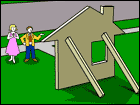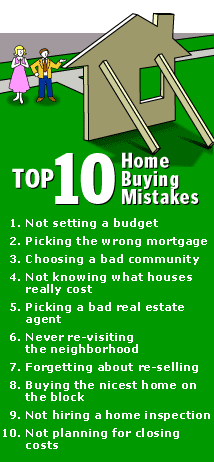
NEW YORK (CNN/Money) -
So, you're ready to take the plunge and buy a new home. Maybe it's your first brush with the American dream. Or perhaps you're moving up in the world.
No matter. The same pitfalls await whether you're shopping for a starter home or a lavish mansion. And in the current market, with houses selling within days -- even hours -- of being listed, buyers are prone to make mistakes.
"The problem is people get caught up in a wave and they get steered into a transaction," said Richard Roll, president of the American Homeowners Association. "They think, 'If I don't [buy] now I'll never be able to do it.'...You've got to do your homework."
You didn't set a budget
Buy a home that's way out of your price range and you could well derail your ability to fund other important items such as retirement savings, your kids' education -- not to mention an entertainment budget.

Mortgage brokers will tell you how much you can borrow. But that amount may not be what you can afford to pay, said Eric Tyson, co-author of "Home Buying for Dummies."
"What if you have a lot of kids or you like to travel a lot?" he said. "You've got to ask 'How is this housing purchase going to affect our monthly spending?' You have to look at all of your monthly expenditures."
Experts say your total monthly debts, including your mortgage, should not exceed 36 percent of your income before taxes. (To help find the right-priced house for you, read our primer on how much home you can afford. And for help estimating how much mortgage you may get, try our mortgage qualifier.)
You picked the wrong mortgage
These days, many homebuyers are rushing to secure a mortgage as fast as possible without fully exploring their options. That's because sellers often only consider bids from individuals who have been pre-approved for a loan. A word of advice? Pick your financing package with care.
| |
 Related Stories
Related Stories
| |
| | |
| | |
|
Among your choices: adjustable rate mortgages, or ARMs, and the more traditional fixed-rate mortgages. These days,15-year fixed mortgages have interest rates of 6.39 percent compared with 6.8 percent for the 30-year loan. Keep in mind that shorter-term mortgages will cost more per month since you're paying off your loan faster. Monthly mortgage payments on a 15-year fixed loan typically run 25 percent higher than the 30-year option, said Keith Gumbinger, vice president at HSH Associates.
First-time home buyers may qualify for a program through Fannie Mae (800 732-6643) that requires lower down payments and easier qualification limits than standard loans.
You picked the wrong community
Some places are just flat-out expensive, and you'll probably have to search for a location that's affordable. That doesn't mean you should choose the cheapest locale.
If you don't like the location you'll be unhappy. What's more, you'll probably have a hard time selling your property if the community isn't good. Ask around and read the local papers to know how the community is faring economically, what the major issues are, how many resources it offers.
Don't neglect the schools. Gather such data as test scores, statistics on the percentage of kids who graduate and go to college, the student/teacher ratio and so on. Talk to parents and students to get the inside scoop.
You didn't know what homes really cost
The best way to determine if you're getting a fair deal is by comparing the cost of the home you're interested in with similar homes in an area. You can do this easily by having your Realtor provide you with a CMA (that's short for Comparable Market Analysis). A CMA lists such things as addresses of recently sold homes, prices, date sold, the number of bedrooms and bathrooms and -- ideally -- such things as the home's condition, its size and extra features.
You used a bad real estate agent
Don't make buying a home more difficult by choosing the wrong agent. You want a buyer's agent who works for you and understands your needs and financial limitations.
References from friends can help you find a good pro. Interview three, and ask to see their activity lists, which reveal every property the agent sold (or whose clients bought) in the past year. Look at sales prices. Make sure the agent has significant experience in the area where you want to live and the price range that you're looking for.
You never went back to check on the neighborhood
If you're like most homebuyers, you probably spend many weekends looking for a new dwelling. But what happens to the neighborhood on weekdays or after dark? Is the house that's "convenient to town" sitting on a main thoroughfare that fills up with cars come commute time?
The only way to answer these questions is to go back and see what the neighborhood's like at various times of the day and week. Do your neighbors spend weekends with the stereo blaring? You want to know as much about the neighborhood as possible before you buy.
You forgot to consider resale
It's easy when you're house hunting to forget what it's going to be like to sell your home down the road. But as you tour homes, put yourself in the perspective of the sellers. You may be drawn to a home that has quirky features or no closets or just one, tiny bathroom (You can use armoires. Share showers.) But others may not be as enthusiastic. When you buy, think about the day it comes time to sell.
You bought the most expensive home on the block
It's wonderful when you find your dream house, but if it's the most expensive home on the block you could have a problem. Quite simply, your neighbors' lower home values will dampen yours. Remember, people who buy a $500,000 home usually want to be surrounded by other $500,000 homes, not tiny $100,000 bungalows.
Tyson recommends buyers steer clear of homes that cost 50 percent more than neighboring dwellings.
You didn't do an inspection
Bottom line: you should never buy a home without having it inspected. After all, you don't want to learn that you've bought a house that's filled with termites or has a frazzled electrical system. If you're building a new home, an inspection can ensure that all the work has been finished properly.
Home inspections typically run $300 to $600 and usually include a check of a home's heating and air condition systems, plumbing and electrical works, roof, walls, foundation/structure, drainage, the garage and basement.
What's frequently not covered? Termite, radon, asbestos, mold and lead inspections. Don't rely on inspectors to hire other pros to check for these items, said Mike Casey, president of the American Society of Home Inspectors.
"Most home inspectors will describe what they do and what they don't do," Casey added. "It might be a good idea to ask what standards do they work to."
Underground heating oil storage tanks also should be inspected before you buy since leaking tanks cause huge environmental, legal and financial problems. (A seller's disclosure statement should reveal if there's an underground tank on the property.) The Environmental Protection Agency has tank guidelines for homeowners -- plus contacts at state Department of Environmental Protection offices -- so you can find pros to help.
Finally, it's unwise to hire a home inspector who is recommended by a Realtor, since they're likely to refer you to a pro who won't kill a sale. Instead, use recommendations from friends or go to the American Society of Home Inspectors for a list of inspectors in your area.
You forgot about closing costs
Think it's bad to pay tax when you eat out? Wait until you're paying closing costs, which can run 2 to 5 percent of the home's purchase price, according to Tyson.
A mortgage lender should provide you with a specific estimate of what costs will be. But keep in mind they include such things as origination (points) on a loan, escrow fees, title and homeowners insurance, legal costs, property taxes, fees to record your need deed and notary fees.

|

